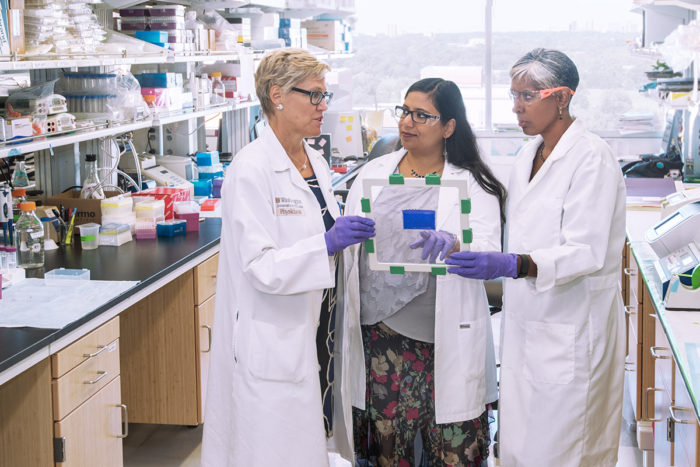New center focuses on women’s and men’s reproductive health
Scientists' collaborations will include Zika virus, preterm birth, infertility
 Robert Boston
Robert BostonWashington University School of Medicine in St. Louis has formed a new center to address important clinical problems and train scientists from around the world in obstetrics/gynecology, women's infectious diseases, and men's and women's reproductive health. From the left are Kelle Moley, MD, director; Indira Mysorekar, PhD, co-director; and Sarah England, PhD, co-director.
A new center at Washington University School of Medicine in St. Louis aims to bring together a cadre of faculty members to conduct basic, translational and clinical research focused on reproductive health. The center, one of only a handful of medical-school based facilities focused on reproductive health, will encourage collaboration in research on issues such as the Zika virus and pregnancy, infertility, labor, preterm birth and urinary tract infections.
The Center for Reproductive Health Sciences will address important clinical problems and train scientists from around the world in obstetrics/gynecology, women’s infectious diseases, and men’s and women’s reproductive health. Scientists also will explore means of bringing to the field personalized medicine, the objective of which is to identify variations in diseases and develop personalized treatment based on those variations. To that end, the researchers will develop animal models of reproductive health disorders, analyze tissue samples, and collect human tissue and fluid samples from throughout a woman’s life cycle.
“The center is a great step forward for research on women’s reproductive health at Washington University,” said George Macones, MD, the Mitchell and Elaine Yanow Professor and head of the Department of Obstetrics and Gynecology. “This expanded center will bring diverse investigators together with the aim of improving women’s health and will further solidify Washington University as one of the lead research institutions in this field.”
The center will be led by director Kelle Moley, MD, the James P. Crane Professor of Obstetrics and Gynecology. Moley is one of a handful of people in the world studying how maternal obesity as well as type 1 and type 2 diabetes affect reproduction, specifically the process of oocyte maturation, embryo development and implantation in mouse models.
Associate directors of the center include Sarah England, PhD, the Alan A. and Edith L. Wolff Professor of Medicine; and Indira Mysorekar, PhD, an associate professor of obstetrics and gynecology. England’s research focuses on how the uterus and blood vessels contract and relax during pregnancy to ensure proper timing of delivery. Her work aims to reduce the frequency of preterm labor.
Mysorekar, who is an expert in host-microbial-immune interactions in the genitourinary tract, studies recurrent urinary tract infections, transmission of the Zika virus from mother to fetus and in the placenta, and the microbiome of the placenta.
“By bringing all of these resources together and recruiting people studying these areas to Washington University, we hope to accelerate the application of lab discoveries into new therapies,” said Moley, who also is vice chair of the Division of Basic Science Research in the Department of Obstetrics and Gynecology. “Our goal is to lead in the area of reproductive health.”
Other School of Medicine faculty at the center include Katherine Fuh, MD, PhD, an assistant professor of obstetrics and gynecology; and new faculty Celia Santi, MD, PhD, an associate professor of obstetrics and gynecology; Yong Wang, PhD, an assistant professor of obstetrics and gynecology; and Rama Kommagani, PhD, who joins the university Oct. 1. Moley said the center hopes to attract 25 to 30 existing faculty interested in reproductive health and sciences.
The center is being funded by the Department of Obstetrics and Gynecology.






